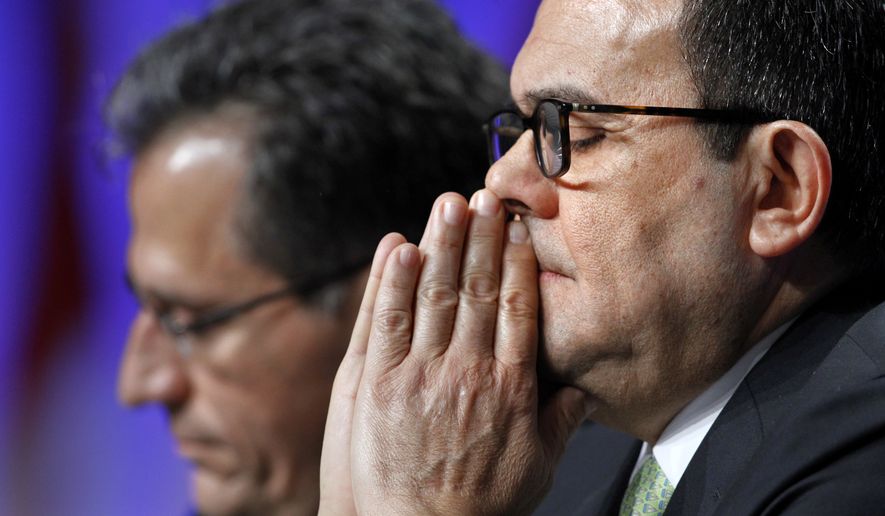President Trump has rattled Mexico and Canada with his bare-knuckle negotiating style and threats to tear up the North American Free Trade Agreement as they enter the second round of talks Friday to redo the three-way trade deal.
Economists warn that the U.S. would suffer an economic hit if NAFTA gets nixed, but the impact would be just as hard on Mexico and Canada. Mr. Trump is pushing that leverage to the limit as he takes the most muscular stance on trade of any president in modern history.
The bluster could scare off U.S. trading partners, but Mr. Trump insists that no trade deal is better than a bad trade deal, whether with Canada, Mexico or China.
Mr. Trump’s threats have prompted Mexican President Enrique Pena Nieto to schedule a trip next week to try to bolster his country’s trade ties with China while NAFTA negotiators gather in Mexico City.
Mexican officials said Mr. Pena Nieto was exploring a contingency plan in case Mr. Trump ends the 23-year-old trade deal.
“I think any world leader that has any sort of relationship with the United States and is now facing President Trump — I think all world leaders are looking to Plan B, and Mexico is no exception,” said Jorge Guajardo, a former Mexican ambassador to China who is close to the NAFTA negotiations.
He said Mr. Trump’s hardball tactics are undermining the talks.
“President Trump likes to think along the lines of leverage. I think that is the wrong approach in this case because by trying to gain leverage he is humiliating and insulting a southern neighbor to the point where the whole deal — whether advantageous or not to Mexico — becomes politically untenable,” said Mr. Guajardo.
Mr. Trump campaigned for office on stronger trade deals and has followed through on those promises.
In addition to forcing a renegotiation of NAFTA, he pulled the U.S. out of the Trans-Pacific Partnership. The 11 other Pacific Rim countries in the deal are continuing to work on it and have included a clause to allow the U.S. an easy return — a sign of how badly they want America’s business.
The president also ordered an investigation into China’s unfair trade practices and theft of U.S. intellectual property.
The administration cracked down on dumping and slapped punitive tariffs on products from scores of countries, including aluminum foil from China, paper from Canada, biodiesel from Argentina and Indonesia, and silicon metal from Australia, Brazil and Kazakhstan — and that was just in August.
Mr. Trump prodded Canada and Mexico after the first round of NAFTA talks in Washington two weeks ago.
“We are in the NAFTA (worst trade deal ever made) renegotiation process with Mexico & Canada. Both being very difficult, may have to terminate?” he wrote on Twitter.
He again threatened to bail out of the deal when stumping Wednesday for his tax reform plan in Missouri, saying the U.S. must shrink massive trade deficits.
“This administration is going to fix that. One by one, we’re fixing it,” he said. “We’re working right now on NAFTA — the horrible, terrible NAFTA deal that took so much business out of your state and out of your cities and towns, and we’re working on it. Let’s see what happens.”
He continued, “Mexico is not happy. But as I told them, ’You made a lot of money for a lot of years, and everybody left you alone. We’ve got to change this deal. And hopefully we can renegotiate it. But if we can’t, we’ll terminate it and we’ll start all over again with a real deal.’”
Canadian Prime Minister Justin Trudeau tried to shrug off the threats.
“There are always going to be words thrown about here and there,” he said. “We will continue to work seriously and respectfully to improve NAFTA to benefit not just Canadians but our American and Mexican friends as well.”
Mr. Trump argues that trade imbalances are hurting U.S. workers. Economists generally disagree with that position because they see trade deficits as a function of U.S. economic power and high consumer demand.
At the NAFTA bargaining table, reducing U.S. trade deficits emerged a major sticking point, officials said.
Mr. Trump also blames NAFTA for luring U.S. manufacturing to low-wage Mexico. That side effect of the deal is well documented.
Still, NAFTA has been an economic boon for some American border states and business sectors, such as agriculture.
Mr. Trump’s trade stance runs contrary to Republican Party doctrine. But it won him support from blue-collar voters, many of whom crossed party lines to swing the election his way. It’s now a question of whether good election politics will make good trade policy.
The president has run into opposition with congressional Republicans and the party’s business allies in Washington.
A leading opponent has been Sen. Jeff Flake, an Arizona Republican whose state has benefited significantly from cross-border commerce.
“NAFTA has been good for Arizona. I hope that we can modernize the agreement but keep it in place. On trade in general, I don’t think we should have exited the Trans-Pacific Partnership,” Mr. Flake, a frequent critic of the president, said recently.
J.D. Foster, chief economist for the U.S. Chamber of Commerce, said Mr. Trump is being risky.
“He ran on trade policies that were deeply concerning to the business community. Since then, his administration has been working through how to manifest those in actual policy, and so far they have been benign — something I we can work with,” he said at the Chamber’s annual Labor Day press briefing in Washington.
“On the other hand,” he said, “withdrawing from NAFTA would be of a completely different character and would suggest that the direction of trade policy is exactly the wrong way to go for the health of the American economy.”
• S.A. Miller can be reached at smiller@washingtontimes.com.




Please read our comment policy before commenting.